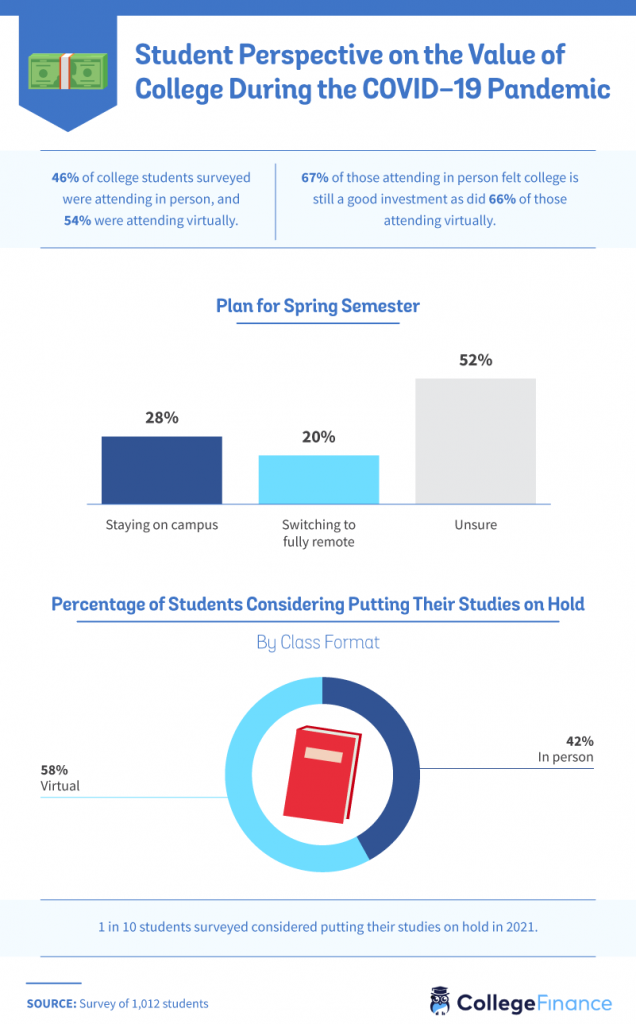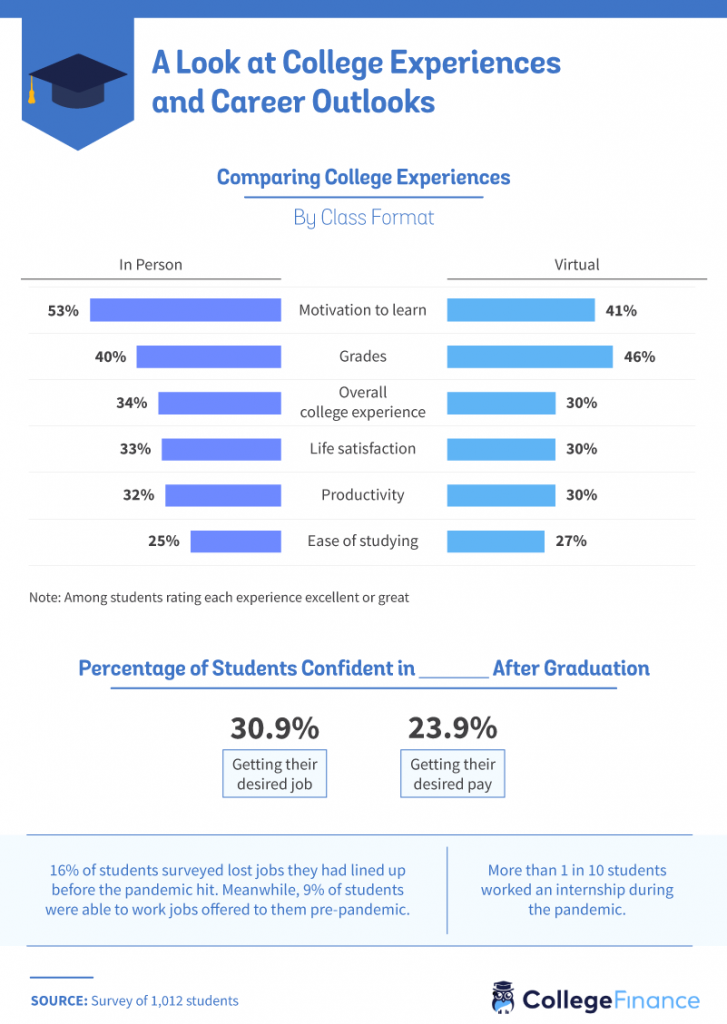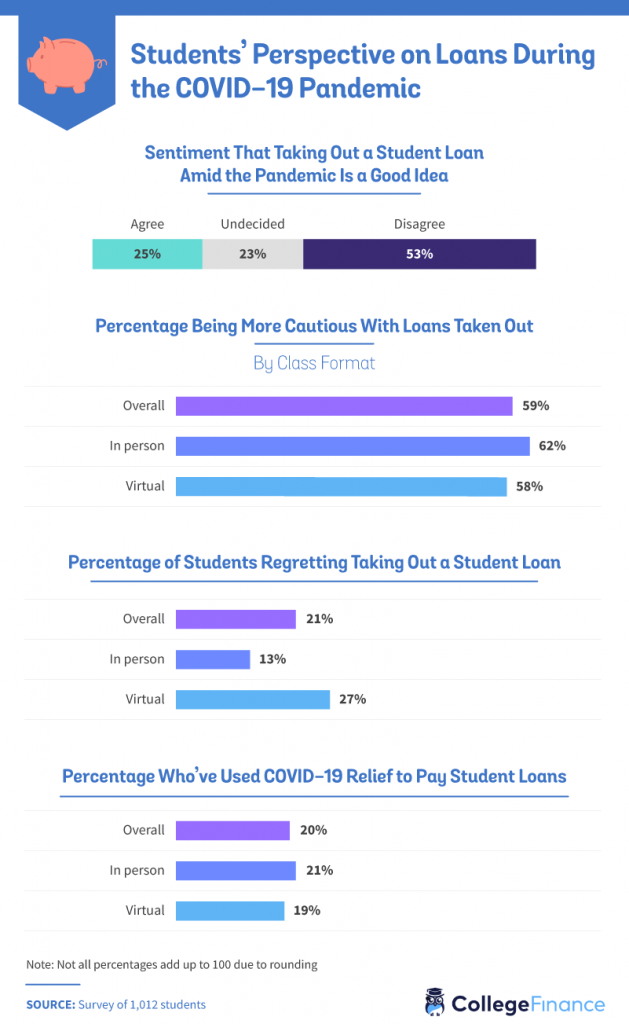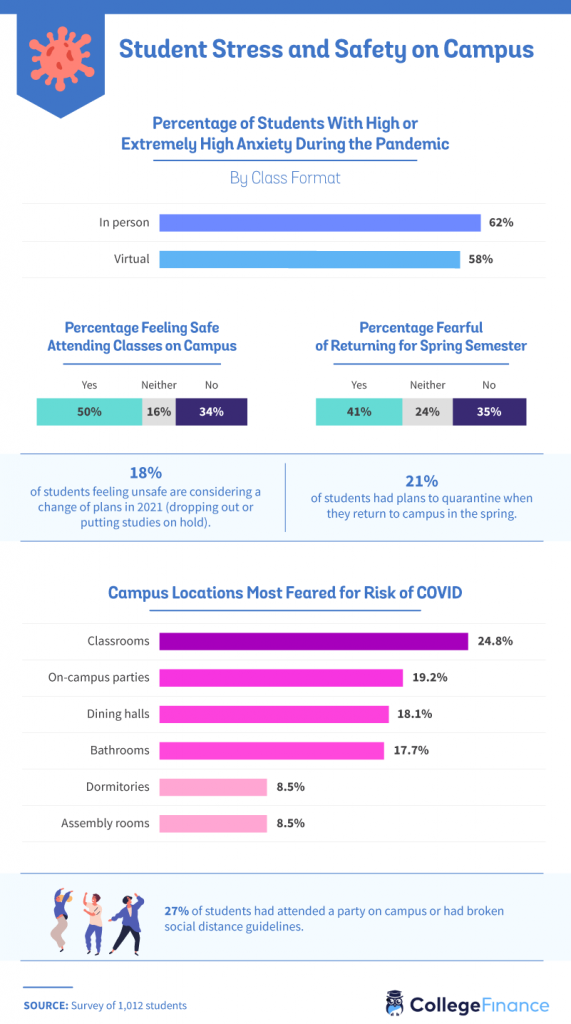What parts of our personal budget aren’t we questioning post COVID-19? Dining out? Buying new clothes? Can anything else go? However, none of those compare to truly big-ticket items, like a good college education and the private student loans that often follow.
Depending on their family circumstances in an incredibly rocky economy, some people may simply not have the money for it. Moreover, pandemic-related safety concerns and school policy don’t always mix well. Thankfully, there are options, both in terms of financing and remote learning. The question is, if the funding is in order, would you want to go to school?
Looking at those facing school decisions right now, we surveyed 1,012 college students in the U.S. They talked to us about what it’s like to go to school in the middle of a pandemic. While some learned virtually, others were learning physically on campus, both of which played heavily into their overall experience. Keep reading to learn more.
Pandemic Education Status Quo
The study begins with an overall look into the percentage of students attending college in person and remotely. Students also share here their plans for the 2021 spring semester, including whether they would consider putting their studies on hold.

As of November 2020, 46.4% of college students are attending classes in person with rocketing COVID-19 cases often in the backdrop or even the foreground, as with the University of Alabama. That said, slightly more than half of college students attending college today are doing so virtually. When asked what approach they would take in the spring semester – virtual or in-person – an additional 20% said they planned to make the switch to remote learning.
Uncertainty also ran high – more than half of students were entirely unsure of what they were going to do in the spring semester. With so little time to decide, 1 in 10 students were considering putting their studies on hold for all of 2021. Virtual students were 16 percentage points more likely to feel inclined to pause their studies during that period.
Student Expectations for Employment
In theory, one of the primary reasons to go to college is to become more employable. The next part of our study asked students to consider this, as well as the impact their current education was having on things like motivation, productivity, and even overall life satisfaction.

Motivation took the largest hit when students had to learn virtually. Motivation to learn witnessed a 12 percentage point drop as students took things home. That said, grades did seem to improve remotely. Considering the decreased motivation, this may have to do with changes in grading tendencies post-COVID or perhaps a different type of student who chooses to stay home.
Though not as dramatically different between virtual and remote learners, highly important factors like the overall college experience and life satisfaction took hits when attending school from home. In other words, there appeared to be a trade-off between grades and ease of learning with experience and satisfaction.
As far as jobs were concerned, less than a third of students felt confident they’d be able to get their desired job after graduation. Even fewer (23.9%) remained optimistic they would get their desired pay. Sixteen percent were even unlucky enough to lose the jobs they had formerly been offered, due to the pandemic.
Financing College in a Pandemic
Of course the question of college finance comes up during times like these. Do students still think student loans amid the pandemic are a good idea? Are they being more cautious about the loans they’re taking out? Any regrets? What about COVID-19 relief? The charts below detail their responses.

Only a quarter of students agreed with the statement that taking out a student loan amid the pandemic is a good idea. The economy, high anxiety, and the downgrade in overall experience are some catalysts behind these numbers. Whatever the case, students were definitely being more cautious about taking out loans, especially if they had virtual learning experience.
Relatively few students were able to obtain COVID-19 relief on their student loans. Only 19% of virtual learners and 21% of in-person students received this kind of help. Many of the changes required by law were also temporary, like setting interest rates to 0% (but only for 60 days). Virtual students were the most likely to regret taking out a student loan.
Campus Emotions
Our study wrapped up with a glimpse into how students on campus say they’re feeling. They candidly shared the more emotional details of life on campus amid a pandemic.

Anxiety levels were high for students in all learning locations. Around 60% of both virtual and in-person learners rated their current anxiety level as high or extremely high. More than a third of those attending classes in person said they feel unsafe, while 41% described themselves as fearful over returning to campus in the spring.
Students feared contracting COVID-19 in classrooms (24.8%), dining halls (18.1%), or campus bathrooms (17.7%). Perhaps, though, what most actually feared was their fellow classmates. On the other hand, 27% said they had attended a party on campus or had broken social distancing guidelines already despite 19.2% also admitting they most feared contracting COVID-19 at an on-campus party.
Campus Considerations
Considering the positives and negatives students experienced both virtually and in person, each student’s decision will ultimately be a judgment call based on what’s right for them, their family, their location, and their health. As you or your loved ones consider the many facets of pandemic-era education, don’t let finances be a reason you are held back from either option.
CollegeFinance.com seeks to help students interested in college afford it, even in these times. Whether you just need help planning or actually funding the school of your choice, College Finance has the experience and the resources to help you immediately. Head to our site today to see how we can be of service.
Methodology and Limitations
We surveyed 1,012 college students on their perspective of the value of their college experience during the COVID-19 pandemic. Respondents’ ages ranged from 19 to 30 with a mean age of 22 and a standard deviation of three. Of our respondents, 36% were women, and 64% were men.
For short, open-ended questions, outliers were removed. To help ensure that all respondents took our survey seriously, they were required to identify and correctly answer an attention-check question.
These data rely on self-reporting by the respondents and are only exploratory. Issues with self-reported responses include, but aren’t limited to, the following: exaggeration, selective memory, telescoping, attribution, and bias. All values are based on estimation.
Fair Use Statement
Connecting is more important than ever. Let fellow students know they’re not alone in how college has them feeling. You’re welcome to share the findings of this article, just be sure your purposes are noncommercial and that you link back to this page to provide proper attribution.


